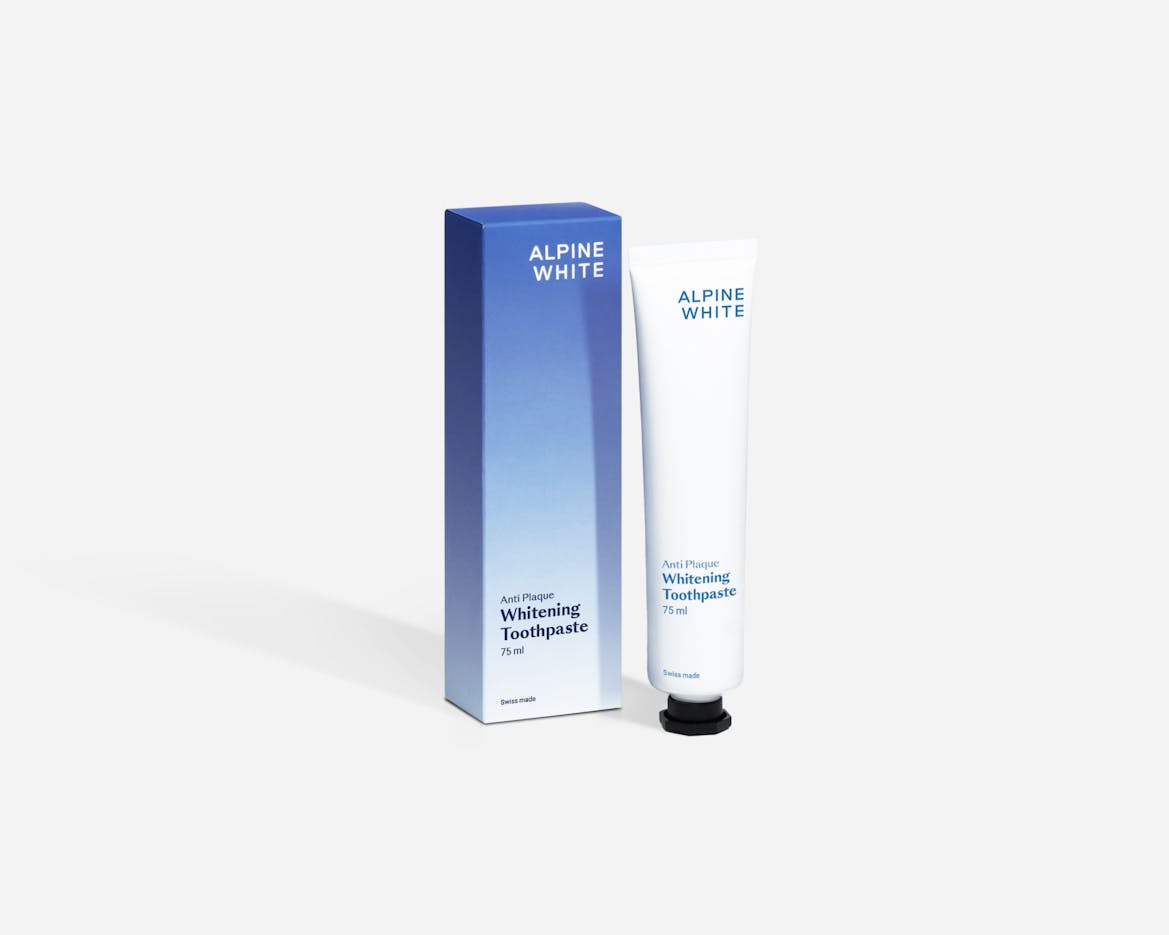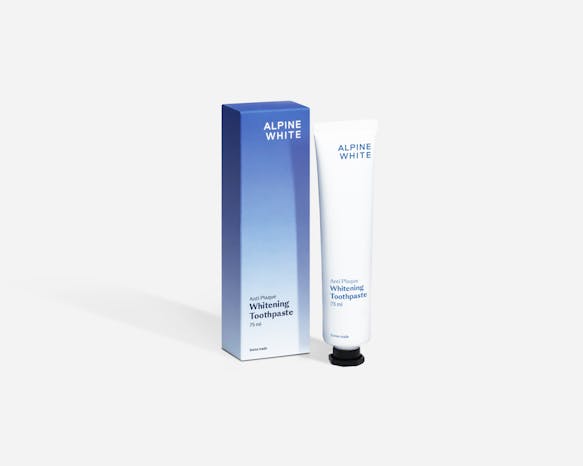Tartar: An unwanted guest in our mouths
Tartar, also called dental calculus, is a solid deposit on your teeth that you cannot remove by rinsing or brushing. It develops when inorganic substances from your saliva are deposited in the soft plaque and can lead to various dental health issues. In this blog post, you will find out how you can prevent that and what you can do against tartar that has already formed.



What is tartar and how does it develop?
Tartar, also known as calculus dentis, is a type of hardened plaque that forms on the surfaces of your teeth. The inorganic substances in your saliva play an important role in your dental health. They help your enamel to recover to a certain extent, especially if your teeth have been affected by eating acidic or high-carbohydrate foods. The damaged enamel is rebuilt by the minerals in your saliva. However, these minerals also get into the dental plaque. This is mainly formed in areas that have not been adequately cleaned when brushing your teeth. Within a few days, this plaque can harden so much that it can no longer be removed by normal daily tooth cleaning.
Tartar formation is a gradual process that often goes unnoticed until it becomes visible or causes discomfort. Tartar can form both above and below your gum line. Above the gum line, it occurs mainly in the area of the large salivary glands, i.e. on your lower front teeth and upper molars. Below the gum line, tartar forms in the gum pockets. It is not visible there and can only be detected by dental hygiene / dental examination.
Tartar is harder than plaque and sticks firmly to your teeth. It has a yellowish to brownish colour and a rough surface. This rough surface provides ideal conditions for more plaque buildup and bacteria multiplication. Therefore, it is important to have tartar removed regularly at our studio. If tartar is not removed, it can increase the risk of tooth decay and gum disease.
Why is tartar a problem?
Although tartar does not directly lead to periodontal disease, the living plaque bacteria adhering to the rough surface are responsible for it. Where there is no plaque, no tartar can form. The rough surface of the tartar forms a retention surface for further plaque, which is subsequently also mineralised. Tartar therefore builds up in layers and can develop over time on all your teeth, especially the front teeth and molars.
Tartar can cause a number of problems that go far beyond aesthetics. The rough surface of tartar provides an ideal breeding ground for bacteria to accumulate and multiply. These bacteria, part of your oral flora, produce acids that attack the enamel and can lead to tooth decay. In addition, the bacteria can cause inflammation of your gum line, known as gingivitis. If this gingivitis is not treated, it can develop into periodontitis, a serious condition that can lead to tooth loss and jeopardise the health of your entire periodontium.
In addition, tartar can also lead to bad breath. This is because the bacteria that colonise tartar produce sulphur compounds that cause an unpleasant odour. This can cause discomfort and affect your self-confidence, affecting your overall oral health and well-being.
In addition, tartar can also affect the aesthetics of your smile. Tartar can be yellowish or brownish and this discolouration is often visible on the lower front teeth and the molars of your upper jaw. This can make you feel uncomfortable when you smile or speak with tartar. In the worst cases, you may even need to consider dentures or implants to restore the appearance and function of your teeth.
All in all, tartar is not only a cosmetic problem, but can also have serious health implications. Therefore, it is important to prevent and remove tartar through good dental hygiene and regular professional dental cleanings.
How can you prevent tartar?
Good oral hygiene is the key to preventing tartar. Regular brushing, at least twice a day, is essential. It is important to use a toothbrush with soft bristles so as not to damage your gums. Electric toothbrushes can be particularly effective as they are often better able to reach all areas of your mouth and remove plaque effectively.
Flossing is also an important part of oral hygiene. Flossing helps to remove plaque and food debris from between the teeth where a toothbrush often cannot reach. It is recommended to floss at least once a day, preferably before going to bed.
A healthy diet also plays a role in preventing tartar. The
Eating sugary foods and drinks can promote plaque formation, so it is important to limit your sugar intake. In addition, drinking plenty of water can help keep your mouth clean and promote saliva production, which helps neutralise acids and clean teeth.
Finally, using fluoridetoothpaste can help strengthen tooth enamel and prevent the formation of tartar. Fluoride helps to remineralise the enamel and make it more resistant to acid attacks caused by plaque bacteria. For optimal prevention of tartar and its consequences, we recommend our Whitening Toothpastes, especially the Anti-Plaque Toothpaste, which prevents the formation of plaque with natural active ingredients, effectively minimising the risk of diseased teeth and gums.
Overall, preventing tartar is a combination of good daily habits, a healthy diet and regular professional dental cleanings at our ALPINE WHITE studio. With these measures, you can help keep your mouth healthy and minimise the risk of tartar and its associated problems.


Your solution for stubborn plaque. Whitening Toothpaste Anti Plaque is designed to remove plaque and whiten teeth at the same time. For daily gentle dental and oral hygiene.
- Removes stubborn stains and tartar
- Based on our clinically tested Whitening formulation
- Remineralizes the enamel and relieves existing tooth sensitivity
- Antioxidants for healthy gums
- ormulated and produced in Switzerland
How is tartar removed?
Tartar removal is an important part of oral hygiene and should be performed regularly. In dentistry, tartar is removed purely mechanically with hand instruments (scalers, curettes) or mechanically, e.g. with ultrasonic devices. Ultrasonic devices remove tartar by means of a high-frequency oscillating metal tip that is moved over the tooth surface with minimal pressure. The vibration of the metal tip generates heat that is dissipated with water.
Tartar removal is a process that requires both skill and precision. The hand instruments used to remove tartar are specially shaped to reach the different surfaces and angles of the teeth. Scalers and curettes are the most common instruments. Scalers are pointed and used to remove tartar above the gum line, while curettes are flatter and used to remove tartar below the gum line.
Tartar removal is followed by polishing of the cheeks and front teeth. This is done with fine rotating brushes and polishing paste. The polish serves to smooth a remaining rough tooth surface caused by tartar residues. A rough surface can act as an anchor point for new tartar formation, so polishing is an important step in preventing tartar from forming again.
It is important to note that tartar removal is a professional process and should be performed by dental professionals. Unprofessional attempts to remove tartar can cause damage to the teeth and gums. Therefore, tartar removal should always be performed by a dental hygienist. Home remedies can help with general dental care, but even they are not able to effectively remove hard deposits such as tartar.
Tartar removal should ideally be performed in a dental office or at our ALPINE WHITE studio, where specialised equipment is available and the risk of injury is minimised. Particular care should be taken when removing tartar from the necks of the teeth and front teeth so as not to injure the sensitive area.
Overall, professional tartar removal contributes significantly to healthy teeth and a healthy oral environment. It is an important step in preventing the plaque and tartar buildup, which is promoted by food particles and carbohydrates. By smoothing out irregularities on the tooth surface, it also makes it more difficult for plaque to reattach.


Regular professional dental cleaning is essential for a healthy mouth and beautiful teeth. Our specialized staff identifies signs of cavities early and prevents them.
- Personalised treatment
- Gum check & caries control
- Painless cleaning with AIRFLOW
Optimal dental hygiene with ALPINE WHITE
Discover first-class oral care from ALPINE WHITE! As mentioned in the previous paragraph, regular professional dental cleanings are essential to keep your mouth healthy. At our ALPINE WHITE studios, we offer thorough dental cleanings as well as painless and effective whitening for brilliant white teeth. Book your appointment today and experience the difference with ALPINE WHITE for a healthy and radiant smile! Trust ALPINE WHITE for optimal dental health and a confident smile you can proudly show off.


Gently achieve whiter teeth with our pain-free in-office bleaching. Carried out by our specialised dental staff.
- Naturally white teeth
- Effective tooth whitening without peroxides
- No change in the tooth structure


